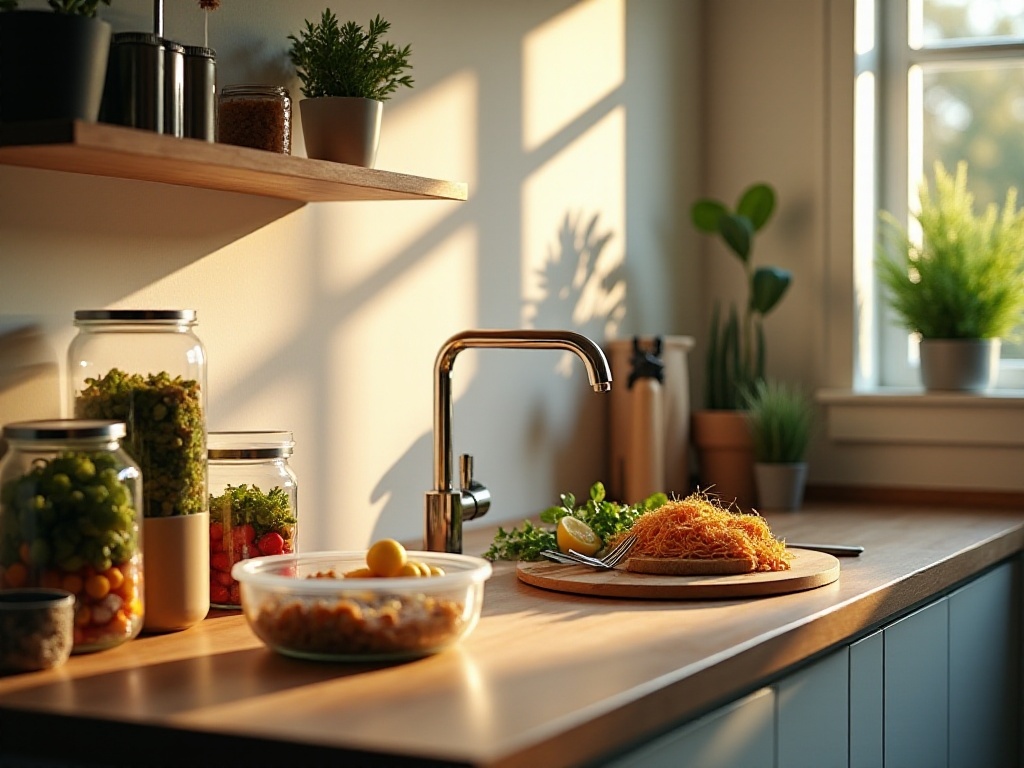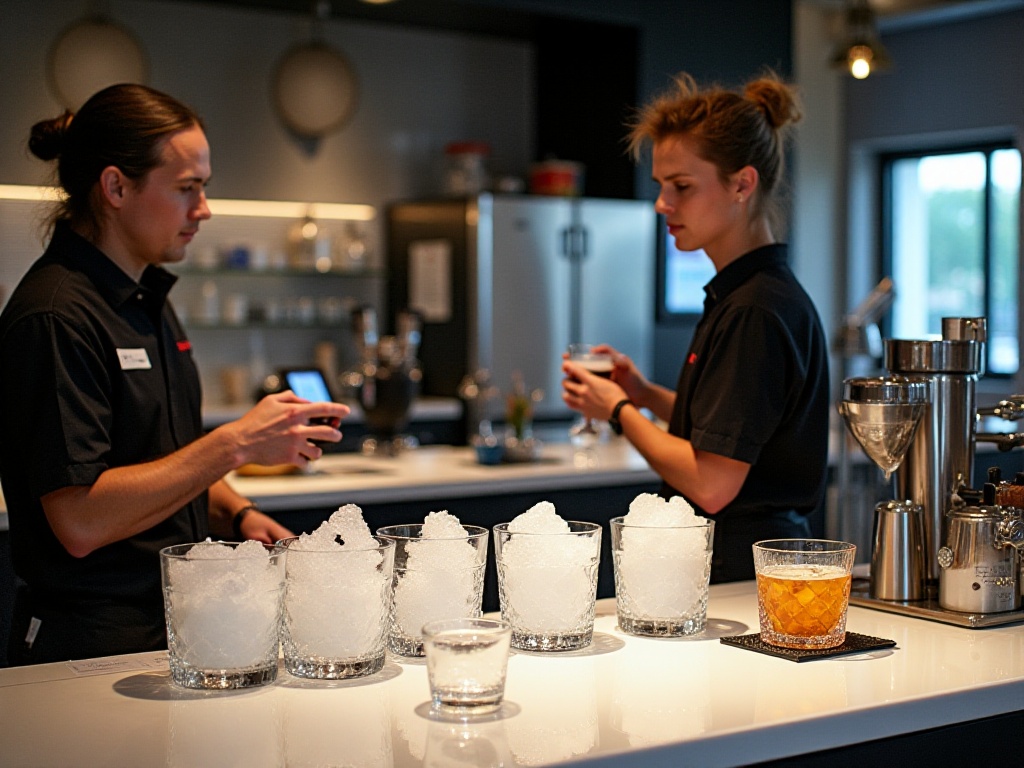
Opening Chat
Waking up every morning feeling like going to battle is probably a common struggle for many young people! Hitting snooze and going back to sleep, then realizing there's not enough time, rushing through washing up and getting dressed, no time for breakfast before dashing out the door. Worrying about being late the whole way, feeling irritable the entire time. I'm so familiar with this situation - this used to be me, racing against time every day.
As a lifestyle blogger who transformed from sleeping in to becoming an early riser, I deeply understand the importance of morning rituals. I used to be a complete night owl, often staying up until dawn, waking up the next day feeling like I'd been run over by a car. But since establishing scientific morning habits, my quality of life has improved dramatically. Now I want to share with you how to create a morning routine that doubles your efficiency.
Evening Preparation
When talking about mornings, a perfect morning actually begins the night before. Now I spend 15 minutes every night preparing for the next day, a habit that has significantly improved my quality of life. You might say, "What can you prepare in just 15 minutes?" But this 15-minute investment can save you at least half an hour the next morning.
First is preparing tomorrow's clothes. I remember last winter, I had a really important meeting one morning. And guess what? My favorite sweater was still wet in the washing machine! That morning I rummaged through my closet looking for alternatives, only to find nothing formal enough. I ended up going to the meeting in mismatched clothes, feeling insecure all day. Since then, I've made it a habit to prepare a complete set of clothes before bed. Not just obvious items like coats and pants, but also details like underwear and socks.
After clothes are ready, next is preparing lunch ingredients for the next day. Young professionals probably all know that ordering takeout for lunch every day is not only expensive but often disappointing. Since I started bringing my own lunch, I've saved money and ensured healthy eating. For instance, if bringing a sandwich, prepare the bread, lettuce, and ham in advance, organized neatly in the refrigerator. The next morning you just need to quickly assemble it. If planning to bring a bento, you can wash and cut the ingredients in advance. Based on my actual statistics, this advance preparation saves at least 20 minutes of morning time each day.
Besides clothes and food ingredients, I also check if all items needed for tomorrow are ready. Is the power bank fully charged, which bag are the keys in, are all necessary documents prepared. Confirming all these things means you won't be frantically searching for things the next morning.

Morning Action
When it comes to early rising, dealing with that annoying alarm is the most headache-inducing part. I'm sure many people have experienced this: hitting snooze thinking "just five more minutes," then opening your eyes to find half an hour has passed. For this problem, my secret is: put the alarm clock at the furthest point from your bed, preferably somewhere you must get out of bed to reach. This way you have to get up and walk over to turn it off, and by the time you get there, your drowsiness has already decreased significantly.
Many people ask me: "Does this really work? Won't you just go back to bed after turning off the alarm?" I can tell you with certainty: it works extremely well. Because when you first wake up, inertia is your biggest enemy. If you can overcome those first few minutes of inertia, the rest becomes much easier. According to my records, after adopting this method, my instances of oversleeping dropped from an average of 4 times per week to less than once.
I now use a progressive alarm clock that wakes you with gentle sounds that gradually increase in volume. This is much friendlier than traditional alarm clocks' harsh ringing. Being gently awakened rather than startled awake makes a big difference in your mood for the entire day.
The first thing after getting up is to immediately make the bed. You might think: "Is it necessary to make the bed so early? I'll just sleep in it again tonight anyway." Actually, this small action is especially important. First, making the bed gives you a sense of accomplishment from completing a task, and this positive emotion affects your state for the whole day. Second, the physical activity of making the bed itself requires some effort, helping you wake up faster. Most importantly, when you return home tired in the evening, seeing a neatly made bed will make you feel particularly pleased.
After making the bed, I open the curtains to let in sunlight and ventilate the room for a few minutes. Fresh air and sunlight are the best natural wake-up aids. Even on cloudy days, it's important to open the curtains and let in natural light. This not only helps regulate your biological rhythm but also makes the room look brighter and cleaner.

Water Drinking Habits
Many people know they should drink water in the morning, but what's the most effective way to do it? My suggestion is to keep a thermal water bottle by your bed. This way you don't have to run to the kitchen - you can hydrate right away. I choose a thermal bottle over a regular one because warm water is easier for the body to absorb and won't irritate the stomach.
Research shows that people lose 300-400ml of water during sleep. This is why we often wake up feeling thirsty. Replenishing water promptly in the morning not only helps your body wake up but also promotes metabolism and helps clear accumulated metabolic waste. I usually prepare 500ml of warm water and slowly drink it within half an hour of waking up. Note the "slowly" part - don't gulp it all down at once, as this allows your body to better absorb it.
While drinking water, I usually do some simple stretching exercises. Things like rotating my neck, moving my wrists, stretching my limbs. These movements may seem simple, but they effectively relieve muscle stiffness after a night's sleep, helping your body enter an energetic state faster.
Many people habitually drink coffee first thing in the morning, but I suggest drinking water before coffee. Drinking coffee on an empty stomach can irritate your stomach, and caffeine can cause dehydration. If you can't do without coffee, it's best to drink it after having enough water and breakfast.
Speaking of breakfast, this is also a very important part of the morning ritual. Don't rush through it or skip it just because you're short on time. A nutritionally balanced breakfast can maintain your energy and improve your morning work efficiency. I usually prepare easily digestible foods like whole wheat bread, boiled eggs, yogurt, and fruit. These foods are nutritious without being too heavy on the stomach.

Results and Benefits
By practicing these morning habits, my life has undergone tremendous changes. First, time management has become more efficient, with about 45 extra minutes of disposable time every morning. This additional time can be used for learning, exercise, or simply enjoying a leisurely morning. Second, my mental state has notably improved, with work efficiency increasing by at least 30%. I no longer need coffee to stay alert, and feel more energetic overall.
Besides improvements in time and efficiency, I've found my emotions have become more stable. Previously, I would start each day in a rush, always feeling tense and anxious. Now with a regular morning ritual, I can face work and life's challenges with a calm mindset.
Moreover, these habits have greatly benefited my physical health. Regular routines have improved my sleep quality - I no longer frequently experience insomnia or wake up in the middle of the night. The habit of drinking water in the morning has improved my digestive system, with noticeable improvement in constipation issues.
What delights me most is that these changes have also affected my social life. Because my schedule is regular, I don't sleep until noon on weekends anymore, leaving more time for various social activities. And with better mental state, I'm more confident in social interactions.

Concluding Thoughts
Optimizing morning routines isn't something that happens overnight - it requires gradual progress. When starting out, you don't need to perfect all elements at once. You can begin with something as simple as "preparing tomorrow's clothes in advance," and once that becomes a habit, slowly add other elements. Remember, forming new habits takes 21 days, but once established, the benefits last a lifetime.
During the process of trying to change, you'll inevitably encounter setbacks. For instance, if you have a late night out, you might not be able to get up early the next day. Don't blame yourself or give up because of one failure. What's important is to adjust promptly and continue good habits the next day.
Morning rituals aren't a fixed model, but a process that needs continuous adjustment and optimization based on personal circumstances. Weather changes, seasonal transitions, and work schedule changes might all require you to adjust your morning routine accordingly. Maintaining flexibility and patience is key to finding what works best for you.
By the way, what are your current morning habits? Do you often worry about getting up early? Or do you have any unique tips to share with everyone? Everyone's lifestyle is unique, and perhaps your experience could inspire others. Let's discuss and improve together, creating our own perfect morning time.
Next
Building Your Healthy Lifestyle from Scratch: An Easy Wellness Guide for Lazy People
A comprehensive guide to healthy lifestyle practices covering nutrition management, exercise, and rest, along with detailed beverage manufacturing standards including formula development, raw material management, production processes, and quality control measures
The Ultimate Guide to Being Lazy in the Kitchen: How to Fit an Elephant in the Fridge
A comprehensive guide covering life efficiency enhancement and professional beverage making techniques, including home organization, kitchen optimization, scientific ice application, and essential elements of drink development
I Developed Hundreds of Trending Beverages - Here Are the Essential Preparations You Must Make
A comprehensive guide covering essential aspects of professional beverage making, including market research, recipe development, process control, and operations management to enhance product quality and operational efficiency
Next

Building Your Healthy Lifestyle from Scratch: An Easy Wellness Guide for Lazy People
A comprehensive guide to healthy lifestyle practices covering nutrition management, exercise, and rest, along with detailed beverage manufacturing standards including formula development, raw material management, production processes, and quality control measures

The Ultimate Guide to Being Lazy in the Kitchen: How to Fit an Elephant in the Fridge
A comprehensive guide covering life efficiency enhancement and professional beverage making techniques, including home organization, kitchen optimization, scientific ice application, and essential elements of drink development

I Developed Hundreds of Trending Beverages - Here Are the Essential Preparations You Must Make
A comprehensive guide covering essential aspects of professional beverage making, including market research, recipe development, process control, and operations management to enhance product quality and operational efficiency


